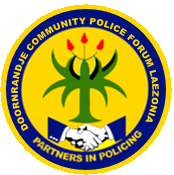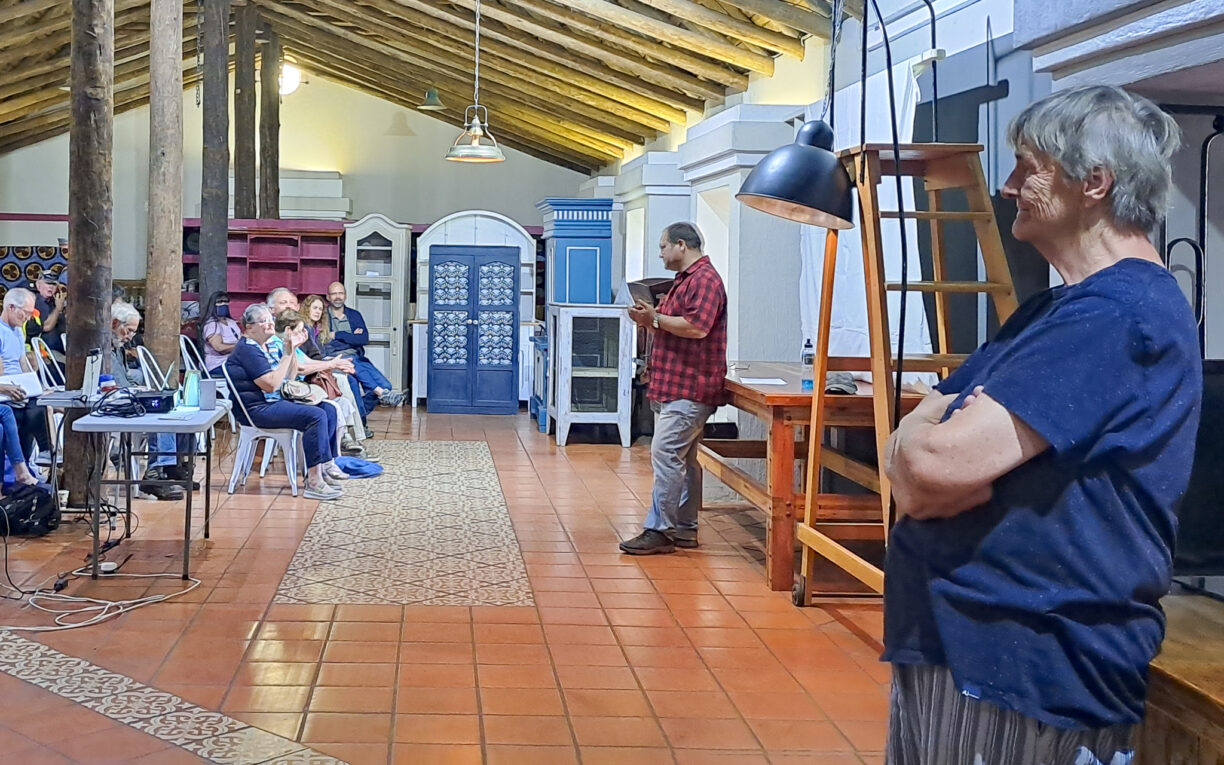Welcome to everyone who took the time to attend this event. We all have jobs and commitments that we have to attend to during the week, therefore we really appreciate and thank each and every one of you for taking this time out of your precious family time. We have most of the role-players responsible for security in our area here today and will be able to hear from them about their initiatives and plans for the area, as well as having a chance to find out more about any burning issue in the community.
We also have information sessions/stalls with several systems or technology that can assist us in various ways to live in a safer, better community. Please feel free to investigate these and support them if you have the means. Coming back to the CPF:
We were invited to the Olievenhoutbosch CPF meeting on 15 March, as neighboring SSF from Erasmia
Amongst the guest speakers were retired major general, Andre Wiese, who has held positions as station commander, cluster commander and deputy provincial commissioner in Gauteng and former MMC Grandi Theunissen.
Between them they shared a wealth of experience and advice, some of which we are already implementing in our own community, and some that we need to seriously look into.
I would like to touch on a few points here:
- First and foremost, the CPF, or sub sectors, are not the police, we are not security firms, and we are not expected to fulfill those roles.
- The CPF is the eyes and ears of the police and security structure in your area.
- Erasmia covers an area of 502 km2 , we have limited officers on duty on a daily basis, we have 2 vehicles available out of a planned 31 vehicles
- It is physically impossible for the resources available to cover this huge area and expect to win the fight against crime
- Both the general as well as former MMC agreed that the only way to win the fight is with teamwork, where the community, security and police work together as a team.
Which brings us to the role of the CPF. Many people do not want to get involved because they do not have the capability to do patrols, do not have the funds to do patrols and other such reasons.
The CPF is not only about community patrols, this is a small part of the function of the CPF.
- The CPF is primarily the link between the community and SAPS. It is there to ensure that the sector station is performing according to its mandate and that all processes are flowing.
- Any issues in the community can either be relayed to SAPS, by the CPF, or vice versa
- As stated, the CPF is the eyes and ears of the community, now how do we do that:
- Visible policing, doing patrols with green lights, spot lights etc. It doesn’t help if there is no plan to this. Crime stats, locations, dates and other info need to be scrutinized and analyzed. According to identified patterns, the patrol coordinator must plan these patrols accordingly. Which area needs to be patrolled, what time the patrol needs to take place and what the lookouts are.
- Crime intel: Talk to your workers, tell them what is happening regarding crime, ask them to keep their ears on the ground and inform you immediately if they become aware of any crime or intended crime that is affecting the area
- For those who cannot patrol for whatever reason: Put CCTV cameras up for street view, assist by actively monitoring the cameras during patrols, or other times as well. Inform the CPF of any suspicious activity detected on the cameras and share the footage/allow CPF/security access to the cameras.
- Install Dashcams in your vehicles, sometimes you pass a vehicle and 3 hours later a report comes in of a suspicious vehicle in the area. Then you can retrieve your dashcam footage and vital information such as facial features, car make and color and even registration number can be obtained.
- Practice situational awareness: be aware of your surroundings, of vehicles following you, of people hanging about where they should not be
- Practice further by focusing on identification of suspects: how many are there, what they are wearing, what car are they driving, what is the reg number, what time did you make the observation and at what location did you make the observation. All of these are vitally important to assist in analyzing the patterns, criminals and areas so that the CPF, security and SAPS can plan better to fight it.
- A good idea also mentioned in the CPF meeting of 15 March was that communities need to look at technology, such as flashing strobe lights at the gate, that can be activated during emergencies, this will assist first responders to find the location sooner and save time in searching for an address
- Plots must be marked uniformly (Not some with street numbers and some with plot numbers) The SSF will be looking into the possibility to negotiate with signage companies to manufacture street/plot number signage to be placed on each property (The ultimate goal will be for as many as possible residents to make use of this opportunity to install proper signage on their gates, marking their property)
- As we know, SAPS and emergency services can sometimes take a while to arrive at an emergency. We had many cases in the past, where first responders from the community were actually able to save properties and lives. Therefore, it is very important that we build the community forum with skills, such as 1st aiders, fire fighters, reaction team members, control persons and lookouts (CCTV street view)
- During attacks, fires, medical emergencies etc. most plots and homes are locked. This makes it impossible for 1st responders to get in, to provide assistance. This may lead to people dying that got hurt during an attack, or who had a medical emergency and needs urgent assistance, it can lead to houses burning down because a fire cannot be put out in time. We need confirmation that, during an emergency 1st responders may cut a fence, break a gate and do whatever is necessary to save lives and homes. It might be a good idea to look at local business that will sponsor repairs to any damages caused by 1st responders
- On a last note: I was involved with the Sinoville CPF from 2008 until 2017, when I moved to this community. Sinoville CPF is a prime example of what can be achieved by a community, security and SAPS working together. They were voted best CPF in South Africa for several times in the past decade. Crime fell to negligible levels. There are over 2000 community members who are on the radio network. The police do not even use their police issued radios anymore, but work on the CPF radio network. This is what teamwork can accomplish.
There are many complaints that I am aware of from the community:
- Police take long to attend to a crime
-For the last few months I have actively monitored cases and several of them the police were on scene in less than 5 minutes… for limited resources in such a vast area, that is impressive no matter how you look at it.
- Police do not have enough resources
-I totally agree. I don’t think there is anybody that does not agree with this. But: we have asked many times since the SSF was created, for people to report the crime to saps, it doesn’t matter how small or irrelevant it might be. The simple logic behind it is: The less we report, the less crime is registered with SAPS, the better the station look, and the less chance they have to successfully request additional resources. If I ask my commander for more staff and more vehicles, they look at my performance. If my performance shows 0 robberies, 0 break-ins, 0 cut fences, 0 smash and grabs etc., the commander will ask why do I need more resources if everything is under control. The more we report, the more evidence our station have to motivate for additional resources. The community is an integral part of this process
- Security companies are not patrolling enough and slow to respond
-They are businesses, they have vehicles to maintain and replace, offices to maintain or pay rent, personnel who needs to be paid salaries and a lot of other expenditure. At the current fuel price, does anybody fairly think that any company can afford to drive up and down an area the whole day and night? If we want bigger visibility, faster responses, we need to invest in our security companies. We need more people to sign up with them, so they can afford to provide us more resources. Economics 101
- Loadshedding is affecting us on all fronts, including the ability to call for help during emergencies
-I am happy to report that we have reached an agreement with Afriforum, and that we will roll out the radio network in the community within the next few weeks. Membership to Afriforum will not be required, but due to Icasa fees, maintenance fees for the repeater etc., a minimum amount of R100 per radio user per month will be required for this service. Taking into account what reception looks like in normal situations, never mind during loadshedding, all I’m asking is: Before you complain about R100 per month, consider what your life is worth during an emergency when that radio will be your only link to call for help.
We are launching several initiatives at this stage, some of which are in final stages before launch while others are already being rolled out.
- Project Eyes and Ears: rolling out community patrols, CCTV monitoring, solar street lamps in dodgy dark places and getting intel from your neighbors and workers.
- Project Care and Assist: helping members with depression and who may be suicidal, providing food and other relieve to struggling members, domestic violence assistance and more
- Project Comms: Setting up a radio network to assist with better communication during patrols, incidents and emergencies where signal may otherwise not be available due to loadshedding or location
- Project Clean-Up: Cleaning up pavements, cutting grass etc. to reduce hiding places and escape routes.
As a last request: A CPF is not the committee… 6 people cannot make a difference here… We need each and every member of this community to be involved, in any way that they can. We cannot make this a safer place for each and every one of us, without all of us taking responsibility and taking action together.
Views: 25


One response to “Wessel Swanepoel, Chairman DLSSF 22/04/2023”
[…] Click here to read the full Chairman’s address […]